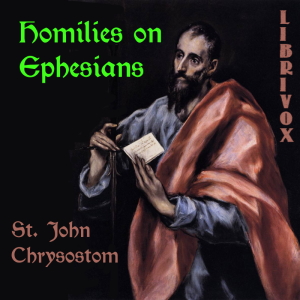
From The Argument: “Ephesus is the metropolis of Asia. It was dedicated to Diana, whom especially they worshipped there as their great goddess. Indeed so great was the superstition of her worshippers, that when her temple was burnt, they would not so much as divulge the name of the man who burnt it. The blessed John the Evangelist spent the chief part of his time there: he was there when he was banished and there he died. It was there too that Paul left Timothy, as he says in writing to him, “As I exhorted thee to tarry at Ephesus.”
“Most of the philosophers also, those more particularly who flourished in Asia, were there; and even Pythagoras himself is said to have come from thence; perhaps because Samos, whence he really came, is an island of Ionia. It was the resort also of the disciples of Parmenides, and Zeno, and Democritus, and you may see a number of philosophers there even to the present day.
“These facts I mention, not merely as such, but with a view of showing that Paul would needs take great pains and trouble in writing to these Ephesians. He is said indeed to have entrusted them, as being persons already well-instructed, with his profoundest conceptions; and the Epistle itself is full of sublime thoughts and doctrines.
“He wrote the Epistle from Rome, and, as he himself informs us, in bonds. “Pray for me, that utterance may be given unto me, in opening my mouth to make known with boldness the mystery of the Gospel, for which I am an ambassador in chains.” It abounds with sentiments of overwhelming loftiness and grandeur. Thoughts which he scarcely so much as utters any where else, he here plainly declares; as when he says, “To the intent that now unto the principalities and the powers in the heavenly places might be made known through the Church the manifold wisdom of God.” And again; “He raised us up with him, and made us to sit with him in heavenly places.” And again; “Which in other generations was not made known unto the sons of men, as it hath now been revealed unto His holy apostles and prophets in the Spirit, that the Gentiles are fellow-heirs, and fellow-partakers of the promise in Christ.”” (St John Chrysostom)

Other Audiobook
Audiobook: Adventures of Sherlock Holmes (Version 6 dramatic reading)
A collection of short Sherlock Holmes stories by Sir Arthur Conan Doyle. Dedicated to Beth
Audiobook: Boy Travellers in Mexico
An engaging travelogue published in 1890, written conversationally among two youths and their guide and
Audiobook: Von der göttlichen Vorsehung (De Providentia)
Du hast mir die Frage vorgelegt, mein Lucilius, warum, wenn eine Vorsehung über die Welt
Audiobook: Mille et une nuits, tome 1
Afin de ne plus être déçu par les femmes, le sultan Schahriar décide d’épouser une
Audiobook: Bars and Shadows: The Prison Poems of Ralph Chaplin
Ralph Chaplin and many other prominent members of the Industrial Workers of the World were
Audiobook: Insurgent Mexico
In the autumn of 1913 John Reed was sent to Mexico by the Metropolitan Magazine
Audiobook: Grimm’s Fairy Stories
Fairies, Evil Step Mothers, Enchanted Forests, Golden Geese, Poor Little Children, Fairy Godmothers, Magic wells,
Audiobook: History of the Jews in Russia and Poland, Volume II, From the Death of Alexander I until the Death of Alexander III (1825 – 1894)
Simon Dubnow was born in 1860 to a poor Jewish family in Belarussian town of
Audiobook: Studies in Stagecraft
A companion piece to Hamilton’s earlier work, The Theory of the Theatre. Where that volume
Audiobook: World’s Famous Orations, Vol. VII: Continental Europe
This book contains a number of famous speeches and addresses from continental Europe between 300
Audiobook: The Dutch Twins
The Dutch Twins are Kit and Kat, 5 years old and not yet big enough
Audiobook: Merchant of Venice
William Shakespeare’s The Merchant of Venice was probably written between 1596 and 1598, and was